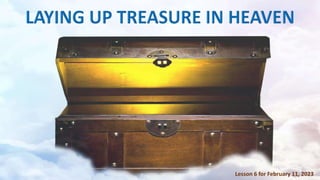
Sekolah Sabat - Triwulan 1 2023 - Pelajaran 6
- 1. Lesson 6 for February 11, 2023
- 3. Jesus said: “Do not lay up for yourselves treasures on earth, where moth and rust destroy and where thieves break in and steal; but lay up for yourselves treasures in heaven, where neither moth nor rust destroys and where thieves do not break in and steal.” (Matthew 6:19-20) How can we lay up treasures in heaven? Let’s learn from those who did so and also from their mistakes.
- 5. God decided to eradicate humankind because of their wickedness (Gn. 6:5-8), and He ordered Noah to build an ark (Gn. 6:13-19). Noah’s attitude proved where his treasure was: Believing the impossible: Rain didn’t exist in that time (Gn. 2:6). The experts claimed that it was impossible for water to come down from the sky. Obeying God: Noah devoted his life and resources to building the ark and to begging his fellow citizens to abandon sin. We face similar challenges today. The experts claim that Creation (the foundation of Sabbath) was impossible. Will we obey God and preach to our fellow citizens?
- 6. Abraham is considered to be the father of faith (Gal. 3:7). His first act of faith was to leave everything he had behind (his “treasures on earth”) to receive what God was promising (“treasures in heaven”). He had been promised a land, but he only got a small piece of land in Machpelah (Gn. 23:17-20). However, he never stopped obeying God, waiting for a much better inheritance from Him (Heb. 11:8-10). The greatest treasure Abraham had on earth was a character similar to Jesus’. That is why his contemporaries considered him a “prince of God” (Gn. 23:6).
- 7. “By faith Moses, when he had grown up, refused to be known as the son of Pharaoh’s daughter. He chose to be mistreated along with the people of God rather than to enjoy the fleeting pleasures of sin.” (Hebrews 11:24-25 NIV) What did Moses renounce? What did he get in exchange? Moses was the son of Hatshepsut and the heir of Thutmose II. He could’ve become the next Pharaoh of Egypt. Egypt was the most important empire on earth in that time. Moses renounced the highest position anyone could have back then. He rejected all worldly glory and pleasure and chose to fulfill God’s call to free Israel from slavery. He considered God’s promises “as of greater value than the treasures of Egypt, because he was looking ahead to his reward.” (Hebrews 11:26 NVI)
- 9. “[…] Lot dwelt in the cities of the plain and pitched his tent even as far as Sodom.” (Genesis 13:12) When Abraham suggested Lot that they should take different paths, Lot wanted “treasures on earth” and coveted the plain of the Jordan River. He was gradually pulled by the call of the city (Gn. 13:8-13). Although he never left God (Peter called him “righteous Lot” in 2 Peter 2:7), his spirituality and his family’s was seriously affected by the life in Sodom. After Abraham’s intercession, God delivered Lot, his wife, and his daughters from the destruction of Sodom. God told him that he had to renounce this world and flee to the mountains (Gn. 18:22-33; 19:15-17). Lot doubted but finally left this world behind and decided to live according to God’s instructions (Gn. 19:30).
- 10. “And He said, ‘Let Me go, for the day breaks.’ But he said, ‘I will not let You go unless You bless me!’” (Genesis 32:26) Jacob longed for the blessing his whole life. His mind was set on the “treasures in heaven.” However, he tried to get them on his own terms (Gn. 27:33-35). After 20 years of work and tricks, Jacob was still suffering the remorse of his foolish action. When he met God, he fought Him to be forgiven and receive the blessing (Gn. 32:22-30). His life was different after that experience. He no longer trusted himself. Like Abraham and Isaac, his only earthly possession was the cave of Machpelah (Gn. 49:29-31). They understood they were strangers and pilgrims on this earth (Heb. 11:13).
- 11. “Laying up treasure in heaven will give nobility to the character; it will strengthen benevolence, encourage mercy; cultivate sympathy, brotherly kindness, and charity. It will unite the soul of man with Christ, by links that can never be broken. You may lay up for yourselves treasure in heaven by being rich in good works—rich in imperishable and spiritual things.” E. G. W. (Our High Calling, July 8) “No man or woman can lay up treasure in heaven without finding life on earth thereby enriched and ennobled.” E. G. W. (To Be Like Jesus, June 28)
